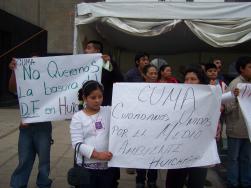CEMEX cannot burn more waste in the state of Hidalgo
In a statement released yesterday by GAIA, the Huichapan community, in the central México’s state of Hidalgo, has achieved a historic victory, after 6 months of protests and legal actions that drove to the closure of the plant of Proambiente company, a subsidiary of Cementos Mexicanos, CEMEX, by the Secretary of Environment and Natural Resources.
This plant was responsible for receiving and processing a large part of the 12,000 tons of solid waste generated daily in Mexico City, to be burned as an alternative fuel in the kilns of CEMEX plant in Huichapan.
Shipping to cement kilns was a major “solution” driven by the Mexico City government (GDF), through an agreement with CEMEX, for the treatment of Mexican capital’s waste, after the closure of Bordo Poniente landfill (the largest in Latin America), in December 2011, and has been strongly criticized for its negative impacts on human health and the environment derived from its potential emissions of heavy metals, dioxins and furans, and other contaminants.
The inhabitants of the town of Huichapan, mainly in the communities of Maney, Dongoteay and Zothe, located around the CEMEX plant, started to feel the negative effects on health and ecosystems when it began to receive and indiscriminately burn waste from DF and organized theirself in the Citizens United for the Environment (CUMA) movement, to resist this false solution to a problem generated elsewhere in the country and raise their own alternatives for waste management.
The local community has been constantly supported by biologist Jorge Tadeo Vargas, from the Global Alliance for Incinerator Alternatives (GAIA), and State Rep. Sandra Ordaz Oliver, President of the Health Commission of the State Congress, who are committed to enforce statewide in Hidalgo the ban of combustion of municipal solid waste and hazardous waste, and promote a Zero Waste law for the state and its municipalities, including more sustainable options such as waste reduction and separation at source, reuse, recycling and composting.

